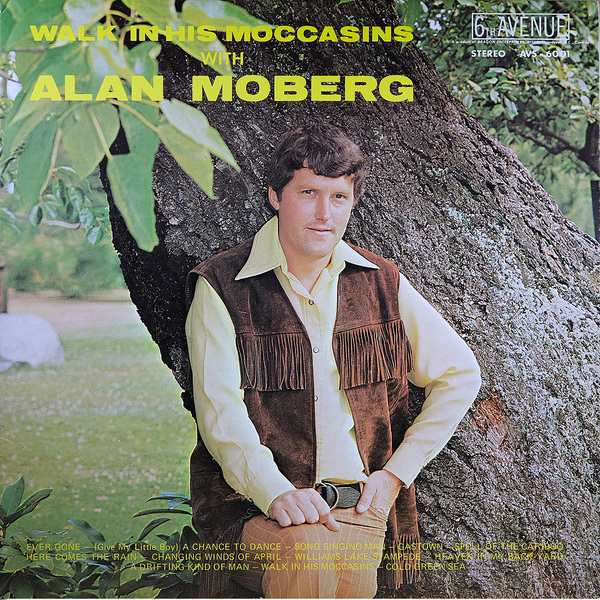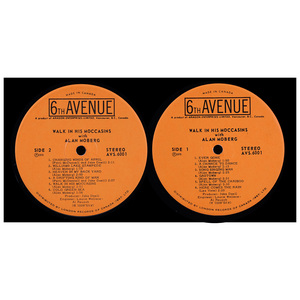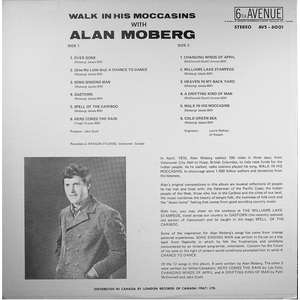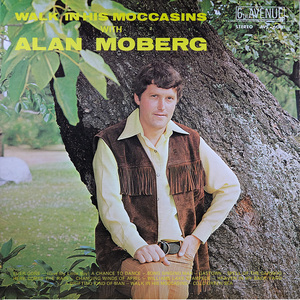Information/Write-up
Alan Moberg, widely known as Canada’s West Coast Troubadour and affectionately nicknamed the Saltwater Cowboy, has devoted more than five decades to writing and performing songs that celebrate the landscapes, people, and spirit of British Columbia. Born in Pender Harbour on the Sunshine Coast in 1944, the son of a fisherman, Moberg grew up with the rhythms of the ocean in his ears and country and gospel music on the radio. He learned guitar as a teenager and began writing songs that reflected the world around him—not Tennessee or Texas, but the Fraser River, the Cariboo, the Gulf Islands, and the working people of the Pacific coast.
His first major success came in 1970 with “Walk in His Moccasins,” a song released in support of Indigenous rights. That same year, during a three-day, 100-mile walk from Vancouver City Hall to Hope to raise funds for non-status Indigenous groups, Moberg’s song was played repeatedly on radio stations to encourage the 1,400 participants and inspire donations. The track introduced his career-long commitment to cross-cultural understanding and respect, which deepened in 1972 when he was adopted into the Gitskahn Killer Whale Clan of Kispiox and given a hereditary name. Later he married into the Kwakiutl clan of Fort Rupert and was honoured with a chief’s name, Hemidi, by Chief Alfred (Hutch) Hunt.
Moberg’s early albums captured this identity as a coastal bard. Dogwood Country (1974) was chosen by the Province of British Columbia for official promotion, with 3,000 copies purchased for distribution and even used in a German film about the province. Songs such as “Gastown,” “Spell of the Cariboo,” “Fulford Valley,” and “Song Singing Man” became part of BC’s cultural fabric. He wrote of stagecoaches, hanging judges, fishermen, and ranchers, but always with a contemporary eye that gave dignity and voice to ordinary men and women.
One of his most enduring compositions is “Williams Lake Stampede,” written in 1970, a song that quickly became synonymous with rodeo life in the Cariboo. It has since been recorded and sung by choirs around the world, reinforcing Moberg’s place as a chronicler of cowboy culture in British Columbia much as Ian Tyson was for Alberta. His “Ashcroft Stampede Song” carried similar weight in the Thompson River Valley, remembered by generations from its use in CFJC-TV promotions.
Moberg’s catalogue stretches across genres: folk, cowboy and western, gospel, and country roots. He is equally comfortable yodeling in the cowboy tradition, singing hymns like “Amazing Grace” and “Whispering Hope,” or covering Kris Kristofferson and Johnny Cash. His own originals—such as “Wild Salmon,” “Cold Green Sea,” “Return to the River,” and “Song for an Indian Carver” (written for his adopted brother, Gitxsan artist Chief Walter Harris)—speak directly to the land, the sea, and the First Peoples with whom he has forged deep connections.
Over the decades he has released more than 15 albums, with songs broadcast on Canadian, American, Irish, and Australian radio. His work has charted on Canadian campus Roots/Blues playlists and been performed by choirs from Jamaica to Czechoslovakia. He has played everywhere from prisons and churches to rodeos, cowboy festivals, heritage days, and community concerts, including the Kamloops Cowboy Festival and the Williams Lake Stampede’s 90th anniversary. His reputation as a storyteller in song has earned him comparisons to Stan Rogers and Valdy—indeed, Valdy himself appears on Moberg’s tribute song “Valdy.”
Among his later works, Northern Love explored the history and beauty of the province; Home and Dry gathered folk and western roots songs; and Farther Along blended gospel, Cash, and Kristofferson with reflections from the folklore of Alcoholics Anonymous. His Christmas album and other recent projects show a voice that remains both supple and deeply rooted. In 2008, Moberg was still at work on his 16th album, continuing a career that never slowed.
Alan Moberg has received multiple honours, including an award from BMI Canada (SOCAN) for “an outstanding contribution to Canadian music” and three awards from the BC Country Music Association. To many, he is more than a songwriter—he is a living thread of BC history, giving voice to the coast, the ranchlands, and the enduring friendships between settlers and First Peoples. Whether performing “Williams Lake Stampede,” leading a gospel jamboree, or singing “Don’t Build Your House on My Bones” in support of First Nations land repatriation, Moberg embodies the role of the troubadour: a singer of his people and his place.
He still lives on Salt Spring Island, balancing music with work as a landscape gardener, and remains a beloved figure at community gatherings. His melodic voice and direct lyrics continue to resonate, touching on endurance, hardship, joy, and the shared spirit of British Columbia. Alan sings—and listening hearts respond.
-Robert Williston
Liner notes:
In April, 1970, Alan Moberg walked 100 miles in three days, from Vancouver City Hall to Hope, British Columbia, to help raise funds for the Indian people. As he walked, radio stations played his song, WALK IN HIS MOCCASINS, to encourage some 1,400 fellow walkers and donations from the listeners.
Alan’s original compositions in this album are musical reflections of people he has met and lived with; the fishermen of the Pacific Coast, the Indian people of the West, those who live in the Cariboo and the cities of our land. His music combines the beauty of simple folk, the liveliness of folk-rock and the “down home” feeling that comes from good sounding country music.
With him, you may re-create the cowboys at the WILLIAMS LAKE STAMPEDE, travel across our country to GASTOWN (the recently restored old section of Vancouver) and be lost in the magic SPELL OF THE CARIBOO.
Some of the inspiration for Alan Moberg’s songs has come from intense personal experiences. SONG SINGING MAN was written after his return back from Nashville in which he felt the frustrations and problems encountered by an artist in that city of entertainers. Concern for the future of his sons in the light of the tragic, prevailing world condition impelled him to write A CHANCE TO DANCE.
Of the 12 songs in this album, 9 were written by Alan Moberg. The other 3 were written by fellow-Canadians; HERE COMES THE RAIN by Les Vogt; CHANGING WINDS OF APRIL and A DRIFTING KIND OF MAN by Patti McDonnell and Jake Doell.




No Comments